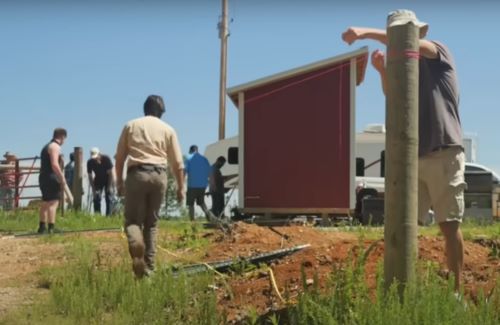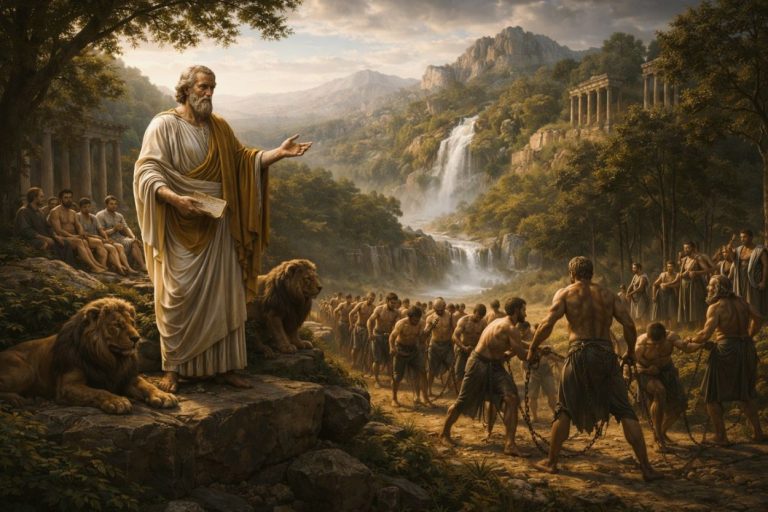

The fields may be quiet in Arkansas. The towns may remain friendly. But the soil is being seeded with something more than tomatoes and corn – an insidious racist community taking root.

By Matthew A. McIntosh
Public Historian
Brewminate
Where Exclusion Takes Root
Along the backroads of the Ozark foothills, amid the hardwood forests and scattered homesteads of northern Arkansas, a quiet movement has been gathering strength. It does not fly flags on highways or march through cities. Its message is not broadcast on cable news. But its ambition is profound, and its intent unmistakable.
It is called the “Return to the Land” movement, and it is founded on the notion that white Americans must separate from what its adherents see as a decaying multicultural society. They do not merely want ideological purity. They want acreage. They want to homestead, raise children, build parallel economies, and reclaim — in their words — “the soil of our heritage.” For them, Arkansas is the chosen land.
What was once a fringe fantasy discussed on message boards and encrypted chat groups has begun to manifest in tangible, troubling ways. Tracts of property are being purchased. Homeschool networks are forming. Like-minded families are relocating from across the country. And quietly, rural counties are absorbing an ideology that mixes agrarian nostalgia with racial exclusion.
A Rural State, a Receptive Terrain
Arkansas is not new to racial tension. The state still bears the scars of school desegregation battles and Jim Crow’s long shadow. But the “Return to the Land” project is not a redux of old segregationist campaigns. It is something else — more modern in tone, more insulated in method, and more digitally connected than the reactionary enclaves of the past.
The state’s geography makes it appealing. Land is cheap. Regulation is sparse. The population in many rural counties is aging or declining, which makes new buyers welcome, at least initially. Counties like Boone, Newton, and Searcy have seen an uptick in homesteaders purchasing large plots, often in cash. On the surface, it looks like a wave of self-reliant families seeking a slower, simpler life.
But beneath that surface is a philosophy rooted in white nationalism, often inspired by groups such as the so-called “Lions of Liberty” or “Vanguard America.” Their messaging, thinly veiled as self-determination, draws from longstanding themes of ethno-separatism and biblical dominionism. Some of the newer settlers maintain blogs and social channels where they discuss everything from water filtration systems to “keeping bloodlines pure.” Their pages are filled with images of children in prairie clothes, guns on handmade racks, and slogans about survival and sovereignty.
Not the First – and Not Alone
The idea of establishing white-only communities is not new. In the 1980s and 1990s, groups like Aryan Nations in Idaho and Elohim City in Oklahoma attempted similar strategies. Those efforts were frequently marred by infighting, law enforcement crackdowns, and national exposure. They faded, but they never fully vanished.
The difference now lies in tactics. Today’s version avoids large compounds and hierarchical structures. Instead, it favors dispersed settlement. The families buying land in Arkansas are not moving into a single place. They are spreading across counties and remaining legally unconnected. Their community is ideological, not municipal. That makes them harder to track and harder to confront.
Many operate under the radar. They appear at farmers markets, volunteer at local libraries, and attend county fairs. By design, they do not advertise their beliefs to outsiders. They call this approach “quiet secession”, a term that has circulated through white nationalist forums since 2020, gaining traction as disillusionment with mainstream politics deepened during the pandemic and the aftermath of the 2020 election.
How Local Communities Respond
Some residents are unaware. Others suspect something, but do not know how to name it. And a few are sounding alarms.
In early 2024, a retired teacher in Newton County began noticing unusual pamphlets in the local feed store, filled with coded language about heritage and “biological destiny.” A neighbor told her several families on their road had moved in from Oregon and Tennessee, each with five or more children, all homeschooled. She attended a town meeting and raised the issue. The response was tepid.
“We don’t want to stir trouble,” one attendee said. Another added, “If they keep to themselves, what’s the harm?”
That question, increasingly asked in rural towns across the South and Midwest, reflects a kind of fatalistic tolerance, one shaped by economic need, cultural fatigue, and isolation. In many places, the arrival of new families is viewed as a blessing, especially if they pay taxes and work the land. That they might also be spreading extremist ideology is often dismissed as rumor or irrelevant.
But some local officials have started paying attention. In Boone County, law enforcement intercepted a group chat planning to distribute anti-Semitic flyers door-to-door. In Madison County, a school board quietly rejected a curriculum proposal linked to a homeschooling network associated with white nationalist rhetoric. The resistance, though limited, suggests an awareness that something more organized is taking place.
Online Infrastructure, Real-World Effects
Much of the movement’s strength comes from its digital scaffolding. Telegram channels, Discord servers, and private forums serve as recruitment and planning hubs. These spaces host workshops on agricultural skills, share real estate listings in “friendly” counties, and offer advice on how to vet neighbors.
One prominent channel with over 20,000 followers hosts weekly video chats about building “parallel communities.” Topics range from seed saving and animal husbandry to legal strategies for avoiding property taxes. Interwoven into these discussions are segments on “preserving European identity” and “raising children outside Babylon.”
The strategy is not to overthrow institutions but to abandon them. The goal, according to many participants, is to outlive the collapse of what they describe as a degenerate society, one corrupted by diversity, globalism, and moral decay. Their vision is not apocalyptic in the traditional sense. It is pastoral, utopian, and deeply racialized.
National Implications, Quiet Normalization
The Return to the Land movement in Arkansas is part of a broader national trend. From eastern Tennessee to parts of northern Idaho, similar communities are forming, often quietly, through property acquisition and cultural immersion. They cloak their agenda in the language of homesteading, faith, and independence, which makes them harder to confront publicly without appearing hostile to rural tradition itself.
The challenge for policymakers and civil society is not only how to respond, but whether they even know what they are facing. Without explicit hate crimes or organized violence, these communities may not meet the thresholds for federal intervention. Yet their long-term presence could reshape local culture, voting patterns, and educational standards.
In a polarized nation where ideology increasingly sorts people by geography, these pockets of soft secession are worth more than a glance. They raise questions about the nature of belonging, the limits of tolerance, and the meaning of community in the twenty-first century.
The Myth of Harmless Separatism
To dismiss these developments as harmless is to ignore history. Separate never meant equal. Self-reliance has often been a euphemism for exclusion. And when ideology becomes embedded in daily life, in schoolbooks, food co-ops, church sermons; it rarely stays private for long.
The fields may be quiet in Arkansas. The towns may remain friendly. But the soil is being seeded with something more than tomatoes and corn. It is being sown with a story, one of ownership, inheritance, and division. And if that story takes root, its harvest will reach far beyond the boundaries of any single farm.
Originally published by Brewminate, 07.30.2025, under the terms of a Creative Commons Attribution-NonCommercial-NoDerivatives 4.0 International license.


